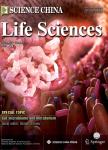Gain of transcription factor binding sites is associated to changes in the expression signature of human brain and testis and is correlated to genes with higher expression breadth
Gain of transcription factor binding sites is associated to changes in the expression signature of human brain and testis and is correlated to genes with higher expression breadth作者机构:Bioinformatics Multidisciplinary Environment (BioME) Universidade Federal do Rio Grande do Norte (UFRN) Programa de Pós-Gradua??o em Genética e Biologia Molecular (PPGBM) Universidade Federal do Pará (UFPA) Department of Computer Science Universidade Estadual do Rio Grande do Norte (UERN) Brain Institute Universidade Federal do Rio Grande do Norte (UFRN)
出 版 物:《Science China(Life Sciences)》 (中国科学(生命科学英文版))
年 卷 期:2019年第62卷第4期
页 面:526-534页
核心收录:
学科分类:0710[理学-生物学] 07[理学] 09[农学]
基 金:supported by the Ludwig Institute for Cancer Research CAPES(23038.004629/2014-19)
主 题:TFBS transcript factor human evolution expression breadth
摘 要:The gain of transcription factor binding sites(TFBS) is believed to represent one of the major causes of biological *** we used strategies based on comparative genomics to identify 21,822 TFBS specific to the human lineage(TFBS-HS),when compared to chimpanzee and gorilla genomes. More than 40%(9,206) of these TFBS-HS are in the vicinity of 1,283 genes.A comparison of the expression pattern of these genes and the corresponding orthologs in chimpanzee and gorilla identified genes differentially expressed in human tissues. These genes show a more divergent expression pattern in the human testis and brain, suggesting a role for positive selection in the fixation of TFBS gains. Genes associated with TFBS-HS were enriched in gene ontology categories related to transcriptional regulation, signaling, differentiation/development and nervous ***, genes associated with TFBS-HS present a higher expression breadth when compared to genes in general. This biased distribution is due to a preferential gain of TFBS in genes with higher expression breadth rather than a shift in the expression pattern after the gain of TFBS.



